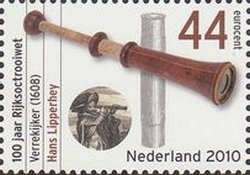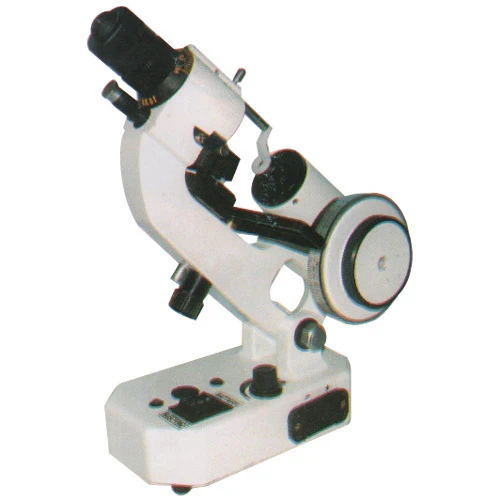Stamp: Dutch telescope, Lipperhey 1608 (Netherlands 2010)
Dutch telescope, Lipperhey 1608 (Netherlands 2010)
09 February (Netherlands ) within release 100 Years of patent goes into circulation Stamp Dutch telescope, Lipperhey 1608 face value 44 Euro cent
| Stamp Dutch telescope, Lipperhey 1608 in catalogues | |
|---|---|
| Michel: | Mi:NL 2735 |
| NVPH: | NVP:NL2706 |
Stamp is horizontal format.
Also in the issue 100 Years of patent:
- Stamp - Submarine, Cornelis Drebbel 1920 face value 44;
- Stamp - LED lighting, Philips 2007 face value 44;
- Stamp - Artificial kidney. Willem Kolff 1943 face value 44;
- Stamp - VacuVin, Bernd Schneider 1987 face value 44;
- Stamp - Milk robot, Van der Lely 1987 face value 44;
- Stamp - Bicycle chain case, Van der Woerd 1974 face value 44;
- Stamp - Handwriting recognition, TNT Post 1980 face value 44;
- Stamp - Solar automobile, Solar Team Twente 2009 face value 44;
- Stamp - Polyethylene fiber, DSM 1979 face value 44;
- Stamp - Dutch telescope, Lipperhey 1608 face value 44;
Stamp Dutch telescope, Lipperhey 1608 it reflects the thematic directions:
An optical instrument is a device that processes light waves (or photons), either to enhance an image for viewing or to analyze and determine their characteristic properties. Common examples include periscopes, microscopes, telescopes, and cameras.
A musical instrument is a device created or adapted to make musical sounds. In principle, any object that produces sound can be considered a musical instrument—it is through purpose that the object becomes a musical instrument. A person who plays a musical instrument is known as an instrumentalist. The history of musical instruments dates to the beginnings of human culture. Early musical instruments may have been used for rituals, such as a horn to signal success on the hunt, or a drum in a religious ceremony. Cultures eventually developed composition and performance of melodies for entertainment. Musical instruments evolved in step with changing applications and technologies.
A telescope is a device used to observe distant objects by their emission, absorption, or reflection of electromagnetic radiation.Originally, it was an optical instrument using lenses, curved mirrors, or a combination of both to observe distant objects – an optical telescope. Nowadays, the word "telescope" is defined as a wide range of instruments capable of detecting different regions of the electromagnetic spectrum, and in some cases other types of detectors.
An invention is a unique or novel device, method, composition, idea, or process. An invention may be an improvement upon a machine, product, or process for increasing efficiency or lowering cost. It may also be an entirely new concept. If an idea is unique enough either as a stand-alone invention or as a significant improvement over the work of others, it can be patented. A patent, if granted, gives the inventor a proprietary interest in the patent over a specific period of time, which can be licensed for financial gain.




